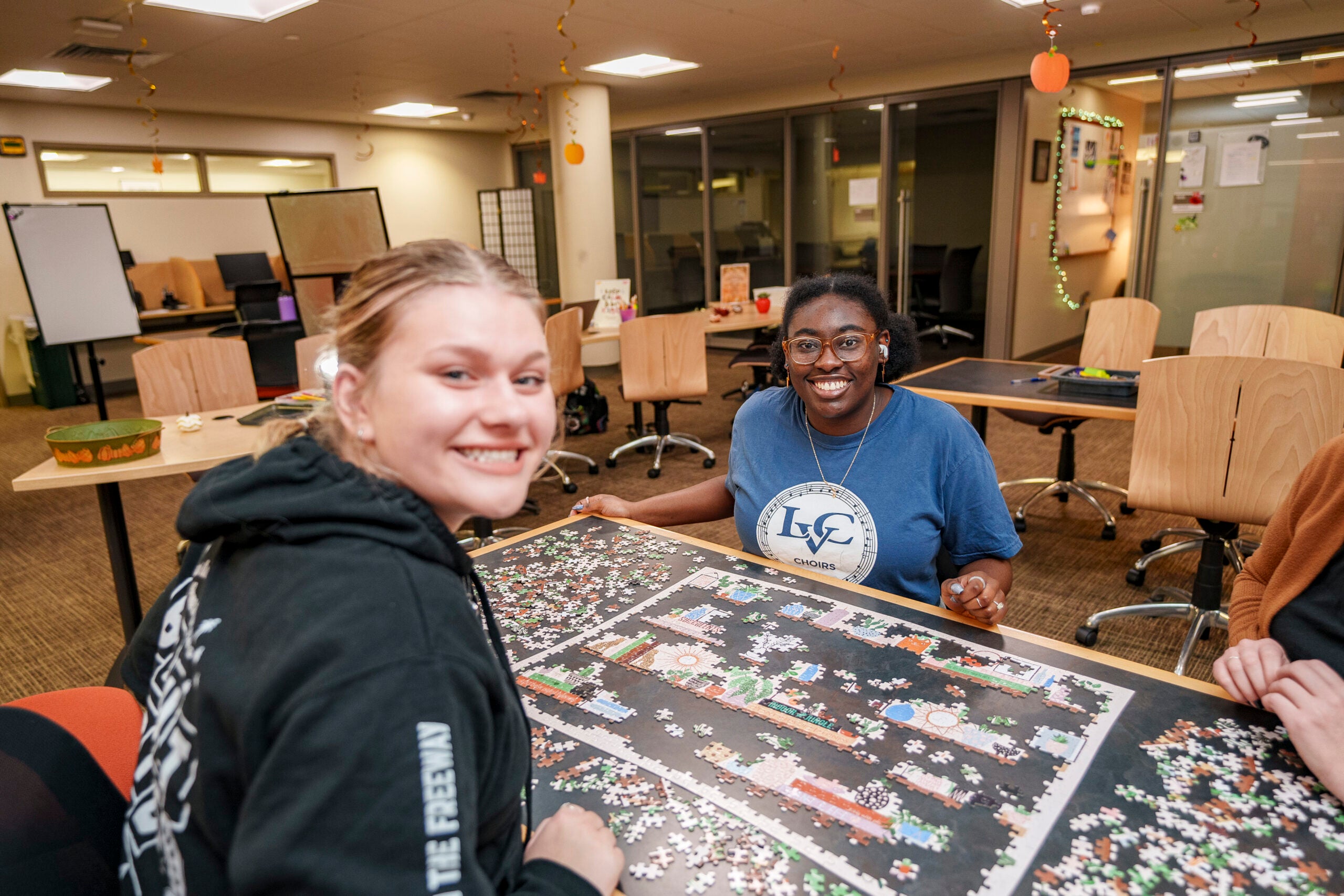
Academic Coaching & Tutoring
In addition to our Academic Support programs, including peer, writing, and organizational tutoring, students also can work with an academic success coach on a weekly, bi-weekly, or one-off basis. The academic success coaches are professional staff members who mentor students by designing and implementing an individualized plan for academic success.
To schedule a meeting, you can send an email to findyoursuccess@lvc.edu and simply say that you want to schedule an academic coaching appointment. One of our coaches will reply within 24 hours. You can also stop by between 8 a.m. and 4:30 p.m., Monday through Friday, and one of our staff members or student assistants can help you schedule an academic coaching appointment. On evenings and weekends, sending an email request is best.
Writing Tutoring
Are you struggling with a paper or looking to improve your writing skills? The mission of the Lebanon Valley College Center for Academic Success and Exploratory Majors is to provide students with the tools, techniques, and confidence necessary to become successful communicators and writers. We do this by creating a comfortable environment in which students and tutors work together at improving writing and thinking across the curriculum.
Peer Tutoring
Do you want higher grades or to improve your study skills? Peer Tutoring offers free assistance to students who want to improve their academic performance. Tutors can be provided for most 100- and 200-level courses offered. Peer Tutors are successful, upper-level students who are trained to help students clarify assignments, understand the subject matter, prepare homework, review homework, prepare for exams, review exams, improve study techniques, and improve time management. Tutors are available for individual and group sessions. Please keep in mind that tutors are students themselves, and it is important to be flexible with appointments if you are looking to receive help.
Organizational Tutoring
Organizational tutors are students who mentor, model, and teach peers effective and healthy time management and organizational skills as well as study habits in order to function independently as a competent and successful student.
How to Request a Tutor
Students can use Starfish to sign up for peer subject tutoring. Once logged in, navigate to the menu button in the upper-left hand corner and select “Courses.” Next to your courses, you will see a Peer Tutoring icon with a “Schedule Appointment” link. Please note that all appointments must be made by 5 p.m. the day before. Same-day appointments cannot be accommodated. For more detailed information, check out Tutoring and Starfish.
If you do not see the Peer Tutoring icon next to a course you’d like a tutor for, please fill out the Tutor Request Form at least 48 hours prior to your desired appointment time.
What are they?
If you are in an FYE, you have an assigned Writing Mentor for your course. Writing Mentors are success-ful, faculty-nominated student writers trained to help new students become stronger, independent, and more confident writers.
How do I meet with one?
Writing Mentors arrange drop-in hours or schedule appointments leading up to each paper due date. They will email their assigned class and professor several days in advance with their plan, but you will schedule a meeting on LVC’s Starfish support system. There are individual and small group sessions available. To do so, you will sign into Starfish, click on the menu drop-down, select “Courses,” and look for your FYE course. From there, you can select “FYE Writing Mentor.”
What do I have to do?
Bring the paper prompt and whatever you have written.
What are they?
You can schedule a 1-1 appointment with a writing tutor during a time that works best for your schedule. Writing tutors work with students at any stage of the writing process.
How do I set up an appointment?
You can schedule an appointment with a tutor on LVC’s Starfish support system. Individual session are available. To sign up for writing tutoring, log-in to Starfish and scroll to the “My Services” section of your Dashboard and select Writing Tutoring. From there, you can follow the prompts to schedule an appointment. If you don’t see a tutor available on Starfish, please visit the Writing Center drop-in hours on select posted weeknights or fill out the Tutor Request Form.
How far in advance should I set up an appointment?
On Starfish, you must sign up by 5 p.m. on the day before the desired appointment, so you will need to plan ahead. If you fill out the Tutor Request Form, we need at least 48 hours’ notice. Any last-minute requests are not guaranteed.
Open Desk Hours
There are writing tutors on-duty on posted weeknights between 7–9 p.m. in the Center for Academic Success and Exploratory Majors. They can help all undergraduate LVC writers in any stage of the writing process. In fall 2024, these hours are Mondays and Thursdays from 7–9 p.m.
What are they?
You can schedule a 1-1 appointment with an organizational tutor during a time that works best for your schedule. Organizational Tutors are students who mentor, model, and teach peers effective and healthy time management skills, study habits, and organizational skills to function independently as a competent and successful student.
How do I set up an appointment?
You can schedule an appointment with a tutor on LVC’s Starfish support system. Individual sessions are available. To sign up for organizational tutoring, log-in to Starfish and scroll to the “My Services” section of your Dashboard and select Organizational Tutoring. From there, you can follow the prompts to schedule an appointment. If you don’t see a tutor available on Starfish, please fill out the Tutor Request Form.
How far in advance should I set up an appointment?
On Starfish, you must sign up by 5 p.m. on the day before the desired appointment, so you will need to plan ahead. If you fill out the Tutor Request Form, we need at least 48 hours’ notice. Any last-minute requests are not guaranteed.
The Center for Academic Success and Exploratory Majors in Mund College Center has a collaborative group study room available for reservation.
To schedule a reservation, please email findyoursuccess@lvc.edu with the date and time of your desired reservation.
Please note that this room is not for individual study. There is a 4-person minimum for 003E.
Reservations also take precedence. If the room is open and you would like to use it, make a quick reservation by sending an email. That way, you know the room availability, and you can ensure that you have secured the room for your group.



